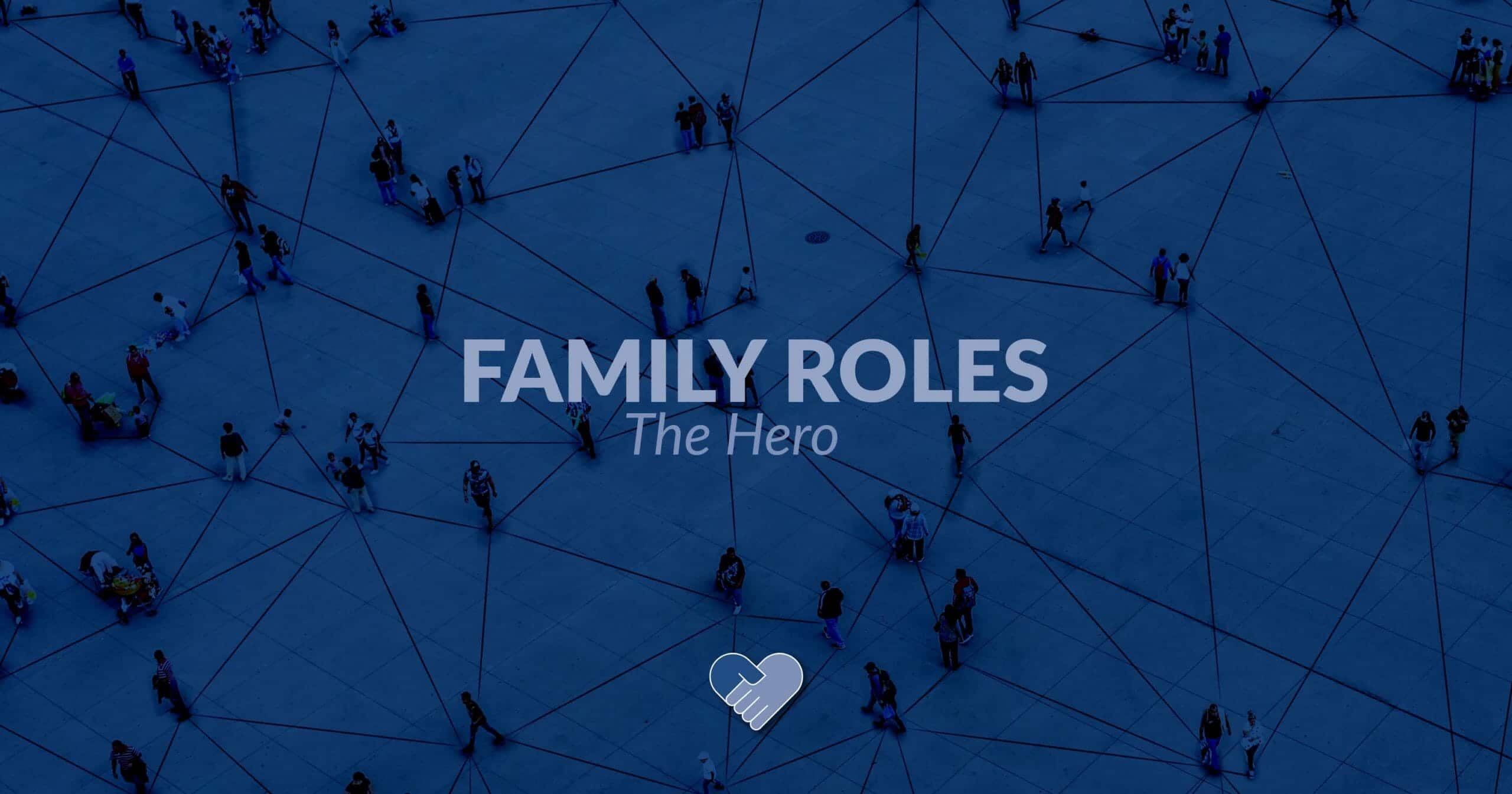Search by category, archive or keyword

“The Hero” is a family role that is also known as the perfectionist and overachiever. The Hero is the family role that is most likely to prevent any help or suggested solutions from anyone other than themselves.
Each individual in a family system will have their own personality characteristics. The problem comes when these personality traits overshadow the true problem at hand.
The hero family member — who is often the over-achiever, strives to be perfect, and considers themselves always right — can actually derail efforts for recovery by stealing the spotlight and trying to make themselves the center of the family’s attention. The hero operates from a place of fear. Some of these are:
- If the substance user gets better, they may take over the hero’s position as the positive center of attention. In the eyes of the hero, the substance user is not doing well and failing at every turn, so they need to be perfect to steal the attention the substance user is receiving. The hero believes the substance user has stolen their spotlight and is resentful.
- If the solution does not support the hero’s ideas, then it’s not a solution. The hero is the person on the call who will most likely stay completely silent. They are building a case with each person’s every word. As soon as the call with the professional hangs up, they pounce. Their goal is to undermine everything that was said in order to derail the idea and the strategies that were not theirs. Their goal is to keep the substance user failing so they are not overtaken by the substance user’s growth and success if they get well. The hero may act the opposite on the call and be overbearing with misplaced emotional questions. Their goal is to frustrate the professional while undermining their ideas. They seek to make the professional look unprofessional, unprepared, or unqualified. They are looking for the “I told you so moment.”

- The anger of the hero is driven by the fear that they have no real solution other than their own agenda. The point is the hero does not have a solution to help the substance user. Their only solution is to keep themselves in the spotlight as perfectionist and overachiever. The only way to get past this is to convince the hero that the whole family and the substance user needs help, and this can’t be done without the hero’s help. They want power and control, so you have to make them believe they are in control of the intervention and the outcome.
- The hero’s true anger is not towards the substance user. It is with the primary enabler. The hero would appear to be mad at the substance user, and rightfully so. The hero is really mad at the primary enabler, although they don’t see it that way. The primary enabler, often mom or dad, is giving all their attention to the underachieving substance user, often a younger sibling. The only way for the hero to compensate is to overachieve in order to steal some of the attention. Let’s face it; the hero has a great job, an education, a family, and has given mom and dad grandkids. For this, they are rarely acknowledged. The substance user who has none of these things doesn’t use alcohol or drugs for a week, and there is a parade. This is obviously an exaggerated example, yet anyone reading this with a substance user and a hero in the family can relate.
- The hero craves control and has to be in charge. The mere suggestion of bringing in an outside resource threatens the hero. The anger the hero exhibits comes from their ego being threatened. They want to be in control of everything. If a plan other than theirs were to work, that would be too much for the hero to bear.
“We have had countless interventions that resulted in the substance user accepting help and doing well after treatment. In almost every situation like this, the hero still blames us for things being done the wrong way.“
It is the job of an addiction interventionist and the interventionist’s aftercare support team to separate the Hero’s problems within the family from the problems of the addict or alcoholic and the need for recovery. The focus of the family needs to return to the addict/alcoholic who needs immediate help.
In Summary:
- The Hero tries to sabotage an intervention because he/she needs to be the one to fix the problems.
- The Hero is afraid the substance user will get better and steal the spotlight. The hero is upset that they have accomplished so much with little attention or recognition, while the substance user is praised for the slightest uptick in improvement.
- The Hero often harbors resentment toward the alcoholic or drug addict. Their real resentment lies with the primary enabler. The problem is that they don’t see it.
- The Hero wants power and control, so you only have two options. You either leave them out of the intervention or make them feel they are in control and that the intervention will never work without them.
- The Hero shoots down any and every solution that is not theirs. The hero has no solution other than maintaining their role of perfectionist overachiever while being in control as the family’s go-to person.
“It is very common for the hero of the family to contact our office after an intervention with a list of complaints. These complaints will outline everything they feel went wrong and what we should do to improve upon our intervention process. They almost always ask for some type of compensation as they feel this will validate them, prove we were wrong, and that they could have done this better. This rarely happens when the substance user refuses help; it almost always occurs when the substance user accepts help.“
Resentment Towards Family Members
The Hero believes they are angry with the substance user when they are really resentful at everyone else in the family; most often, the primary enabler. They are angered at any suggestion of a solution yet have offered no viable solution themselves.
The Hero often gets resentful when it comes time to talk about or deal with the addiction issues in a family member. Again, the individual in this role wants to steal the spotlight. They need to make the issue about themselves and how they wouldn’t have let it get this bad or this far, or they have better ideas to fix the problems It becomes about them when addiction is all about the addict or alcoholic and the effects on each family member.
“The Hero” pokes holes in every solution that is not theirs yet has absolutely no solution themselves. Their only solution is to prevent the family and the substance user from a solution”.
The Hero craves the illusion of control, is comfortable in drama and chaos, and usually has become immune to it, so they often use it to their advantage. Drama in the family can be a smokescreen, covering the real issues. When a family member assumes” The Hero” role, they are not helping the situation and very rarely turn out to be the real hero in the situation.
Convincing A Family Member that They are Making Addiction Worse
Simply put, The Hero is not helping the situation; they are only making it worse. It may be hard for the family to tell this individual to “butt out.” If the hero is not willing to get on board and identify what they are doing, then it may be necessary to remove this person, the drama they create, and their own separate personality or character issues from the circle of immediate issues.

Addiction is difficult enough to sort through without adding the deep emotional issues of another loved one into the mix. Because family members cannot see the issues objectively and try and tackle all the problems together as a family, they often fail to address any of the issues effectively.
“The Hero” in Practice
Siblings are most likely to fill the roles of The Addict and The Hero. We will use the example of brothers — as is often the case. Two brothers are polar opposites of each other.
Brother #1 is the addict, has always struggled through life, and the parents have always rushed to help him when gets into trouble.
Brother #2 was always an overachiever when to Yale, but is now very successful and strives to have the perfect life, family, job, and possessions… the picture is starting to paint itself now, as you can see.
Brother #2 is successful in everything he does and can’t understand why Brother #1 has such a hard time in life. Not only does Brother #2 resent #1 for not understanding and having all the right answers as he has, but he also resents the attention that #1 receives for his shortcomings.
We could follow this example story further, but — as you can see — the problem of drug and alcohol abuse has already been lost in a sea of other familial problems.
Does This Situation Seem Familiar?
Unfortunately, this is the situation in many families, and it causes a confusing and devastating cycle of inaction in the family. The problem of addiction and getting help for the addict cannot be focused on because there are deeper issues that the family is experiencing and need to tackle first.
Families have the right intent to try to work through substance abuse and addiction problems themselves but can’t see through their own problems objectively.
Addiction Interventionists objectively sort through the issues within the family, bring non-productive family members and their unrelated issues together, and focus on the fact that the addicted family member has an addiction problem that may not be improving as the result of each family role working against each other.
Published on May 1st, 2020
Updated on December 27th, 2022
Yes! My Family Is In This Situation and Need Help!
Call Us Now to Learn More About How We Can Help
MORE ADDICTION EDUCATION
WATCH THE ENTIRE INTRO TO FAMILY ROLES WITH MIKE LOVERDE
An intervention is not about how to control the substance user; it is about how to let go of believing you can.
“The most formidable challenge we professionals face is families not accepting our suggested solutions. Rather, they only hear us challenging theirs. Interventions are as much about families letting go of old ideas as they are about being open to new ones. Before a family can do something about the problem, they must stop allowing the problem to persist. These same thoughts and principles apply to your loved one in need of help.”
Mike Loverde, MHS, CIP

